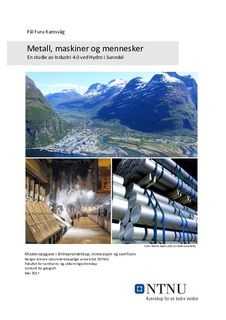| dc.description.abstract | The recent advances in information technology have led to progress in the fields of automation, robotics, sensor technology and artificial intelligence. These technologies are prerequisites for the increasingly popular concept Industry 4.0, which refers to the current trend of automation, digitalization and data exchange in manufacturing. In addition to industrial changes, such as optimized production processes and new value chains, Industry 4.0 and modern information technology could have an impact on employment and the required skills of future industrial workers.
The aim of this thesis is to investigate how the producer of primary aluminium, Hydro Sunndal, relates to Industry 4.0 and digitalization. The study has three research questions. The first one examines which challenges and opportunities Industry 4.0 and modern information technology gives Hydro Sunndal. The second research question deals with how Industry 4.0 and automation/robotics affect the workforce at Hydro Sunndal, and if an eventual downsizing at the plant will have consequences for the local community. The final question examines which qualifications, skills and education future industrial workers at Hydro Sunndal will need.
This thesis relies on a comprehensive fieldwork consisting of both qualitative interviews and observation, along with a theoretical framework with contributions from researchers and academics in several disciplines.
The results of the study show that Hydro Sunndal is capable of implementing several technological solutions that comes with Industry 4.0. However, the specific work conditions in aluminium production could give Hydro Sunndal more challenges than companies operating in other industries. Industry 4.0 and more automation/robotics will likely lead to a moderate downsizing at Hydro Sunndal in the near future. The local community will probably cope well with a moderate reduction of the workforce at Hydro Sunndal, but could have more difficulties if a bigger and more rapid downsizing occurs in the future. The empirical findings coupled with literature suggest that future employees at Hydro Sunndal will need more skills and new competencies due to Industry 4.0. Better computer skills, a better understanding of statistics and data analysis, and more knowledge related to automation and robotics will be in demand. | nb_NO |
